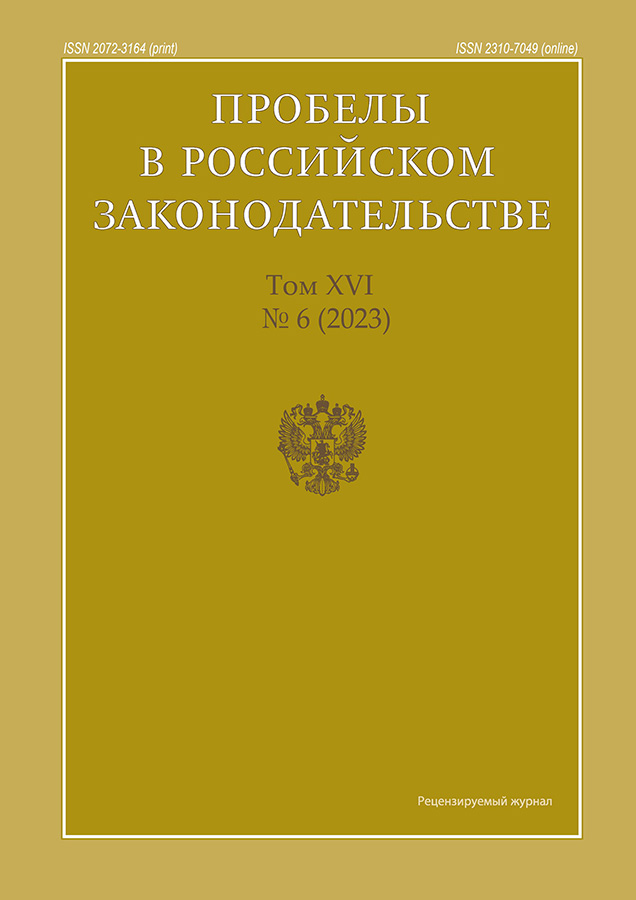Problems of Criminalization in the System of Social Control
- Авторлар: Kravets I.P.1
-
Мекемелер:
- Volga State University of Water Transport
- Шығарылым: Том 16, № 6 (2023)
- Беттер: 185-196
- Бөлім: Criminal Law Sciences
- URL: https://journals.eco-vector.com/2072-3164/article/view/623607
- EDN: https://elibrary.ru/QLQYUC
- ID: 623607
Дәйексөз келтіру
Аннотация
The article examines the issues of criminalization as a process of establishing by the state the public danger of a certain phenomenon in the life of society, which poses a threat to established social relations and requires criminal legal protection. Representing a complex socio-legal institution, criminalization presupposes the existence for its implementation of following certain principles, based on well-known grounds and constituting the mechanism for criminalization. The originality and peculiarities of this phenomenon in criminal law-making are of considerable interest for theoretical analysis and law enforcement. The purpose of the presented study is to define social control as a historically established system of influence on a person, aimed at organizing its activities within the framework of accepted rules and social values that express public interests. As well as questions of scientific support of the phenomena occurring in criminal rule-making, their connection with the criminal policy of the Russian Federation. Based on the study, the author comes to the conclusion that criminal law policy is directly related to the problems of criminalization, which is the method of its implementation. The criminalization of socially dangerous acts is justified only if it provides reliable criminal law protection of public relations. Criminalization also achieves another task of criminal law - regulatory. By establishing prohibitions, criminal law norms thereby regulate people's behavior.
Толық мәтін
Авторлар туралы
Ivan Kravets
Volga State University of Water Transport
Хат алмасуға жауапты Автор.
Email: kipkn@mail.ru
SPIN-код: 7211-3157
Scopus Author ID: 824982
Cand.Sci.(Law), Head of the State Law Disciplines Department, Institute of Economics, Management and Law
Ресей, Nizhniy NovgorodӘдебиет тізімі
- Avanesov G.A. Criminology and social prevention. M., 1980. P. 473.
- Akhiezer A.S. Russia: criticism of historical experience. // Sociocultural Dictionary. T. 3. M., 1991. P. 147.
- Borodin S.V. Crime control: a theoretical model of an integrated program. M., 1990. P. 188.
- Belov S.D., Chekmacheva N.V. Criminal prosecution for mediation in bribery // Legitimacy. 2011. N 10. P. 41-44.
- Voronin Yu.A. Trends in modern bourgeois criminal policy. Voronezh, 1983, p. 121.
- Galperin I.M. Punishment: social functions, practice of application. M., 1983.
- Demidov Yu.A. Social value and assessment in criminal law. M., 1975. P.47.
- Zhukov Yu. Values as determinants of decision-making: A socio-psychological approach to the problem. // Psychological problems of social regulation of behavior. M., 1976. P. 258.
- Zlobin G.A., Kelina S.G. Some theoretical issues of criminalization of socially dangerous acts. // Problems of justice and criminal law. M., 1978. P. 111-112.
- Igoshev K.E. Social control and crime prevention. Gorky, 1977. P.30.
- Karaev T.E. Problems of combating crime in the Republic of Azerbaijan. Baku, 1992. P. 271.
- Keyzerov N.M. Power and authority: Criticism of bourgeois theories: Monograph. - M.: Legal literature, 1973. - P.49.
- Clark R. Crime in the USA. M., 1975. P. 195.
- Kobets N.G. Prevention of offenses in the production team. M., 1982. P. 40.
- Kononov A.L. Some features of legal consciousness and legal education of persons who have committed crimes through negligence // Legal consciousness and legal education of convicts. M., 1982. P. 86.
- Korobeev A.I. Soviet criminal law policy. Vladivostok, 1987. P.88.
- Kudryavtsev V.N. Law, action, responsibility. M., 1986. P. 279.
- Kudryavtsev V.N. Criminalization: optimal models // Criminal law in the fight against crime. M., 1981. P. 5.
- Kudryavtsev V.N. Knowledge of the legal norm // Soviet state and law. 1983. No. 9.
- Kuznetsov A. P. Criminalization - decriminalization, penalization - depenalization as the content of criminal policy // Bulletin of the Krasnodar University of the Ministry of Internal Affairs of Russia. - 2017. - No. 1 (35).
- Minkovsky G.M. The concept and system of measures to prevent crime among young people. M., 1971.
- Parsons T. The system of modern societies / Per. from English. L.A. Sedov and A.D. Kovalev. Ed. M.S. Kovaleva. - M.: Aspect Press, 1998. - P.20.
- Pobegailo E.F. On serious distortions in the implementation of Russian criminal policy // Modern criminal policy: the search for an optimal model. Materials of the VII Russian Congress of Criminal Law. M., 2012.
- Ratinov A.R., Efremova G.Kh. Legal awareness and criminal behavior. // Legal awareness and legal education of convicts. Collection of scientific papers. - M. - 1982. P. 47.
- Sokolova M.A. Defects in legal documents: monograph / M.A. Sokolov. - M.: Publishing house "Jurisprudence", 2016.
- Smaus G. Everyday Theories on Criminology among the German Populations with regard to Maarginalisation. IX International Congress of Social Defense. Caracas, 1976.
- Fefelov P.A. Criminal law concept of combating crime. Yekaterinburg, 1999, p. 70.
- Filimonov V.D. Criminological foundations of criminal law. Tomsk, 1981. P. 63-82.
- Harding S.L. Class Conflict and the Supression of Tramps in Buffalo, 1892-1994. // Law Society Review, 1977. P. 673.
- Shibutani T. Social psychology. M., 1966. P. 307.
- Shikhirev P.N. Social attitude as a subject of socio-psychological research. // Psychological problems of social regulation of behavior. M., 1976. P. 288-289.
- Shur E. Our criminal society. M., 1977. P. 320.
- Yakovlev A.M. Grounds for criminal law prohibition. M., 1982. P. 121,126.
- Yakovlev A.M. Theory of criminology and social practice. M., 1985.
- Yani P.S. Mediation in bribery // Legitimacy. 2011. N 9. P. 16.
Қосымша файлдар








